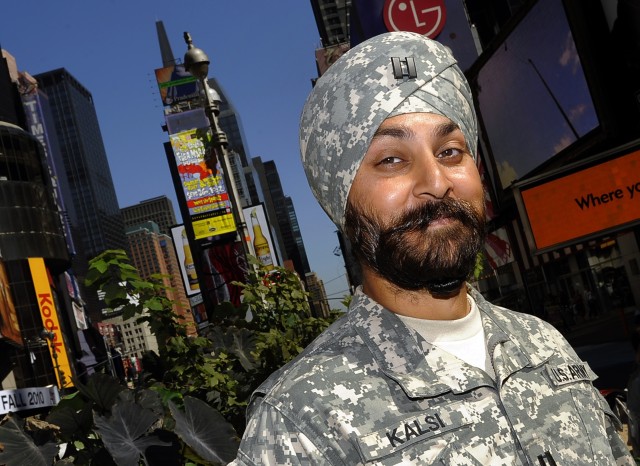
FORT BRAGG, N.C. - When Capt. Kamal Kalsi first arrived in the United States from his native India, he was a 2-year old toddler, who had been born into a Family with a long history of military service.
Kalsi marks the fourth generation of serving in the military, with his great-grandfather having served in the Royal British army and his grandfather and father having served in the air force in India.
What distinguishes the younger Kalsi's service is that he is a Soldier in the United States Army, assigned to Womack Army Medical Center's Emergency Department.
What makes his service the same is that Kalsi is a Sikh, which has been classified as the fifth largest religion in the world.
Sikhism, said Kalsi, is a monotheistic religion that comes out of what is today India, based on the belief of a warrior tradition and the core principle of defending the defenseless.
As part of Kalsi's religious uniform, he wears unshorn hair and a turban while in public. In an Army of shaved beards and short hair, being unshorn makes Kalsi stand out at WAMC, but it does not make him different.
"Everybody has been welcoming and extremely supportive," said Kalsi, who added that he did not face any issues while also undergoing officer field training this summer.
Fellow servicemembers and the Army as an institution have supported him as a brother, he said. Being a member of the armed forces has enabled Kalsi to teach others about Sikhism.
"It's important to know about other religions. I think it makes you well-balanced and stronger in your own religious principles and understand that we're not all that different from one another," he said.
But, his entrance into the Army was a little different. Kalsi is fighting to change the practice of having to get an exception to the Army regulation regarding the wearing of religious items, which would have required him to shave his beard and remove his turban. The process was a long one that could not have been successful without the help of the Sikh coalition, dedicated to increasing Sikh diversity.
A petition of more than 15,000 signatures, including nearly 50 members of Congress was submitted to the Department of Defense Secretary Robert Gates to allow Kalsi to serve in the Sikh tradition, he said.
Sikhs have a historical and cultural tradition of community service, Kalsi said.
"The military is a great place of opportunity for so many people and I wanted those doors opened for our community, he added. But there was also one very concrete and sustained reason for wanting to join the service - "I wanted to do it for my son, said Kalsi, who is the father of 2-year old Kabir.
Sikhs have served in the military since the early 1900s and have been present in every major war, fighting alongside allied forces, said Kalsi, who will soon join that historical heritage when he deploys to Afghanistan.
Being able to practice medicine seems to have its own reward.
"You get to help people in their greatest time of need and so I feel privileged to be able to do that," he said.
Even during times when Kalsi has been mistaken for a Muslim, it seems that being a Soldier advances cultural understanding and upholds the religious foundation upon which America was founded.
"As Americans, it's kind of what we're about. We like our freedoms and that's what sets us a part from other parts of the world," Kalsi said. "Ultimately, this makes it an Army that celebrates the diversity of its people and makes us a stronger Army."

Social Sharing